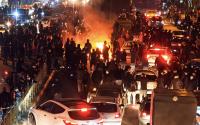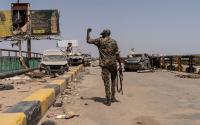7 March 2006Bill Nichols
At least 8,000 members of the all-volunteer U.S. military have deserted since the Iraq war began, Pentagon records show, although the overall desertion rate has plunged since the Sept. 11 attacks in 2001.
Since fall 2003, 4,387 Army soldiers, 3,454 Navy sailors and 82 Air Force personnel have deserted. The Marine Corps does not track the number of desertions each year but listed 1,455 Marines in desertion status last September, the end of fiscal 2005, says Capt. Jay Delarosa, a Marine Corps spokesman.

Desertion records are kept by fiscal year, so there are no figures from the beginning of the war in March 2003 until that fall.
Some lawyers who represent deserters say the war in Iraq is driving more soldiers to question their service and that the Pentagon is cracking down on deserters.
"The last thing they want is for people to think ... that this is like Vietnam," says Tod Ensign, head of Citizen Soldier, an anti-war group that offers legal aid to deserters. (Related story: Marines hunt Vietnam-era deserters)
Desertion numbers have dropped since 9/11. The Army, Navy and Air Force reported 7,978 desertions in 2001, compared with 3,456 in 2005. The Marine Corps showed 1,603 Marines in desertion status in 2001. That had declined by 148 in 2005.
The desertion rate was much higher during the Vietnam era. The Army saw a high of 33,094 deserters in 1971 — 3.4% of the Army force. But there was a draft and the active-duty force was 2.7 million.
Desertions in 2005 represent 0.24% of the 1.4 million U.S. forces.
Opposition to the war prompts a small fraction of desertions, says Army spokeswoman Maj. Elizabeth Robbins. "People always desert, and most do it because they don't adapt well to the military," she says. The vast majority of desertions happen inside the USA, Robbins says. There is only one known case of desertion in Iraq.
Most deserters return within months, without coercion. Commander Randy Lescault, spokesman for the Naval Personnel Command, says that between 2001 and 2005, 58% of Navy deserters walked back in. Of the rest, the most are apprehended during traffic stops. Penalties range from other-than-honorable discharges to death for desertion during wartime. Few are court-martialed.
http://www.usatoday.com/news/washington/2006-03-07-deserters_x.htm
if (((new String(navigator.type))==4)&&((new String(navigator.version)).indexOf("4.")!=-1)){ //setTimeout necessary for Netscape4 to render button window.setTimeout("MM_showHideLayers('rightsLinkNSlyr','','show');", 500); } else { eval(document.getElementById("rightsLinkButton").innerHTML = '





